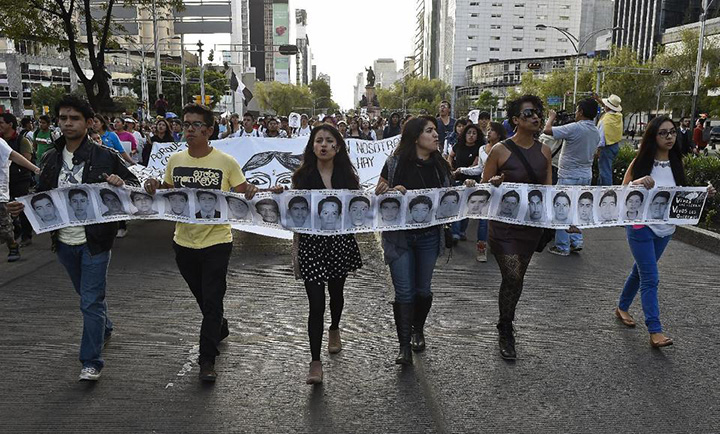
Mexican soldiers and federal agents are closely monitoring the rural town of Iguala, Guerroro after the bloody massacre of student teachers by corrupt police officers and drug cartel criminals two weeks ago. Thursday's discovery of four more grave sites led to today's vigil at the Raul Isidro Burgos rural teacher's college in the Ayotzinapa neighborhood of Tixtla, Mexico.
On Oct. 4, the first of many mass grave sites was found and 28 bodies discovered. The Mexican Federal Government sent nearly 200 Mexican Army soldiers, Marines and Federal Police to stand guard at the exhumation last week. Forty-three students remain missing.
More than 30 officers and alleged gunmen from the cartel Guerreros Unidos, or Warriors United, have been arrested.
Student teachers from the Ayotzinapa Teacher Training College stole three commercial buses from the city depot to make their way to a planned demonstration in Mexico City. Considered to be a frustrating but accepted practice, students confiscated the vehicles from local a transit operation with the understanding that it would be returned after the trip.
But the student teachers would not make it to the demonstration - one that commemorates the military massacre of students in the capital square of Tlatelolco in the days prior to the 1968 Olympics.
On Sept. 26, as the buses were headed out of town, the unarmed students were ambushed by police and members of the drug cartel. The vehicles were sprayed with bullets, and some students attempted to fend off their attackers by throwing rocks. One trainee teacher, 19-year-old Julio César Mondragón, attempted to flee on foot.
Mondragón's body was found the following day, dumped on a busy street, his skin peeled off and his eyes gouged out - the calling card of drug cartel killers.
For a country known for corruption, police brutality and oppression, the mass murder has induced outrage across the nation. Many of the students attending the small college - about 100 miles south of Mexico City - come from the farming hills of Guerrero, and have been forced to live in impoverished conditions due to corrupt government officials, murderous drug lords, and the harmful vigilante groups that have risen up.
According to the Associated Press, graduates of the college and others in the school system are guaranteed teaching jobs that pay just $500 a month at schools often reachable only on foot.
For Jose Luis Romero, attending the school was an opportunity to improve his life and earn money to support his six siblings and his mother, now a widow.
"He said: 'Mom, I'm going to study, to try to get ahead. Don't you see, now that my dad's dead I have to do something,' " his mother, Macedonia Torres Romero, told the AP.
Mexican prosecutors attribute the disappearances to police who witness report drove off with students in their vehicles. The police are believed to have turned over the students to a local drug gang that apparently had ties to the family of Iguala's mayor, Jose Luis Abarca, according to the AP. Abarca fled town four days after the killings, followed by the Iguala police chief, who has a warrant out for his arrest.
On Monday, Mexican President Enrique Pena Nieto spoke of justice for those killed. "This is infuriating, painful and unacceptable," he said in a televised address to the nation. Elected in 2012, Pena Nieto promised to reduce the cartel killings.
While the total number of homicides declined by 15 percent his first year in office, as reported by Time, Guerrero state is still suffering from a homicide rate of 61 per 100,000 inhabitants.
For Torres Romero, an increase in that number could change her life forever. "They took him away alive, and that's the way I want him back. I'm staying here until I find out about my son. I'm not leaving here till then."














